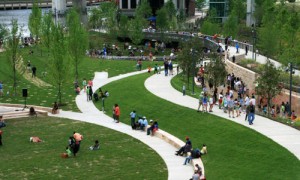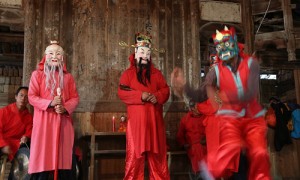It is said that faith is both a gift and a task. By Saturday this week most Muslims around the world will have begun observing the month of Ramadan, the ninth month of the Muslim lunar calendar known as the month of fasting. Between sunrise and sunset, the adult and able Muslim, neither eats nor drinks and while many continue their day as normal, others take time out from their daily schedule for increased prayer and worship. But this year Ramadan will prove a particular challenge to the estimated 3,000 Muslim athletes coming to the UK for the Olympics.
人们说信仰既是馈赠也是任务。这周六,世界各地大多数的穆斯林要开始庆祝斋月。斋月是伊斯兰历的第九个月,是穆斯林封斋的月份。健康的成年穆斯林在日出后到日落前禁止一切饮食,许多人继续日常的生活,有些人会抽空花更多时间做祷告和礼拜。不过今年的斋月有一项特别的挑战,大约三千名穆斯林运动员将来英国参加奥运会。
This is probably the first time in recent history when the Olympic Games and Ramadan coincide. Some have chosen to defer their fasts till the games are over while other will probably train and compete around their 16 to 17 hours of fasting. It's true that some people find fasting easier than others, but personally speaking I'm amazed at any athlete who feels able to compete having gone without food or drink for so long. In London mosques are organising themselves to lay on evening meals or iftars to welcome all athletes of all backgrounds, Muslim and non-Muslim as a gesture of solidarity and hospitality. Sacred time will hopefully bring people together in new ways and create new friendships. While Ramadan is understood as a fundamental pillar of Islam, it can often become one of the most debated issues of faith.

这也是奥运会和斋月自近代以来的第一次相遇。有的人选择在奥运会结束后进行斋戒,然而,有的人也许会锻炼自己,在比赛的同时完成每天16到17小时的斋戒。当然,对一些人来说,斋戒并不像其他人觉得的那样吃力,但就我而言,只要有运动员在这么长时间内不吃不喝的情况下还觉得自己有竞争力,我都会感到惊叹不已。伦敦的各个清真寺都在组织提供晚餐或者开斋小吃给所有运动员享用,不论他们是何种出身,是否是穆斯林,展现他们团结一致、热情好客的姿态。神圣的时刻有希望能以崭新的方式把人们聚集在一起,结成新的友谊。斋月被认为是伊斯兰教基本的精神之柱,因此它常被卷入信仰这一饱受争议的话题。
There are exemptions from fasting for the elderly, the pregnant, the sick and infirm, those travelling, those on medication but these categories are traditional categories not always catering for the demands of modern times. Summer months here in the UK are the most challenging with long periods of daylight when life in theory should go on as normal but is simply not possible for so many. Every year there are debates and rulings about who can be exempt, how to make up for missed fasts, but in my view, people's approach to Ramadan remains quite conservative and in fact its difficulty becomes its very appeal. It's sacred time, a holy month and in the eyes of many fasting remains the ultimate act of endurance and patience in obedience to God. The Qur'an itself refers to fasting in various verses but one reads, "God intends for you ease, and He does not want to make things difficult for you." This kind of verse can be open to a variety of interpretations about how to live your faith more respectfully, not just in this month but throughout life. Physical abstinence is undoubtedly difficult but like all rituals, the period of self-reflection is essentially about transforming oneself both in body and soul.
老人、孕妇、病弱之人、旅人和需要服药的人可以不进行斋戒,但这些只是传统的规定,并没有顺应现代社会。英国夏天的这几个月日照时间长,极具挑战性,尽管在理论上能够正常生存,但实际上对许多人都是不可能的。每年人们都为谁能免于斋戒以及如何弥补错过的斋戒争论不休,制定各种规定,但依我看来,人们对待斋月的方式依旧十分传统,而且许多难题亟待解决。这是一个神圣的时期,一个圣洁的月份,在许多人眼中,斋戒是遵从真主表现忍耐力和耐心的基本行为。在《古兰经》中,有各种各样描写斋戒的诗句,有一句这样说到,“真主赐予你从容,他不会让你为难。”这一诗句从多种方面诠释了应如何更加恭敬地对待自己的信仰,不仅仅在这一个月里,而是在整个生命历程中。毫无疑问,在生理上完全禁食是非常困难的,但和所有宗教仪式一样,人们自省的本质是从身心上改变自己。







